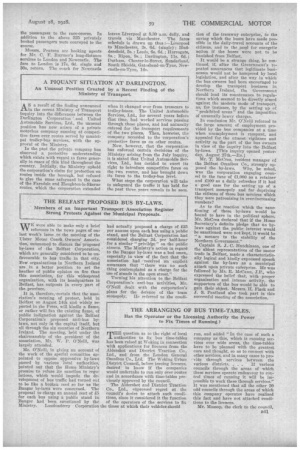THE BELFAST PROPOSED BUS BY-LAWS.
Page 25

If you've noticed an error in this article please click here to report it so we can fix it.
Members of an Important Transport Association Register Strong Protests Against the Municipal Proposals.
WE were able to make only a brief reference in the news pages of our last week's issue to the meeting of the Ulster Motor Coach Owners' Association, summoned to discuss the proposed by-laws of the Belfast Corporation, which are generally considered to be unfavourable to bus traffic in that city. Few organizations in Northern Ireland are , in a better position to set the heather of public opinion on fire than this association, for this widespread organization, with its headquarters in Belfast, has outposts in every part of the .province.
It is, therefore,certain that the association's meeting of protest, held in Belfast on August 14th and widely reported in the Press, will kindle a flame; or rather will fan the existing flame, of public indignation against the Belfast Corporation's proposed anti-bus bylaws, not only in the capital itself, but all through the six counties of Northern
Ireland. The meeting, held under the chairmanship of the president of the association, Mr. W. P. O'Neill, was largely attended.
Mr. O'Neill, in giving an account of the work of the special committee appointed to oppose oppressive bylaws passed by various local authorities, bointeci out that the Home Ministry's promise to refuse its sanction to regu, lotions, which would impede the development of bus traffic had turned out to be like a broken reed so far as the Bangor by-laws were concerned. The proposal to charge an annual rent of 15 for each bus using a public stand ill Bangor had been sanctioned by the
Ministry. Londonderry Corporation the tittles at which their vehicles should
had actually proposed a charge of £25. per annum upon each bus using a public stand, and the Belfast Corporation had considered charging 3d. per half-hour for a similar " privilege " on the public streets. The Ministry's action in regard to the Bangor by-laws was a bad omen, especially in view of the fact that the association had • received an explicit assurance that "there was no such thing contemplated as a charge for the use of stands in the open street."
Turning his attention to the Belfast Corporation's anti-bus activities, Mr. O'Neill dealt with the corporation's plans for the defence of the tram monopoly. He referred to the condi tion of the tramway enterprise, to the saving which the buses have made possible in the daily-travel accounts of the citizens, and to the need for energetic action if the buses were not to be banished from Belfast.
It would be a strange thing, he continued, if, after the GOvernment's repeated assurances that legitimate businesses would not be hampered by local legislation, and after the way in which the bus owners had been encouraged to develop the transport business in Northern Ireland, the Government should lend its countenance to regulations which seemed to be directly aimed against the modern mode of transport, as for instance, by the setting up of " prohibited areas" and the imposition of unusually heavy charges.
In conclusion Mr. O'Neill referred to the large amount of employment provided by the bus companies at a time when unemployment is rampant, and appealed for the utmost vigilance and activity on the part of the bus owners in view of the inquiry into the Belfast by-laws. [This inquiry opened yesterday, August 27th.—En..1
Mr. T. McCrea, resident manager of the Belfast Omnibus Co., strongly op
posed the by-laws. Why, he asked, was the corporation engaging counsel to the time of £1,000 as a retainer and £100 as a daily refresher if it had a good case for the setting up of a transport monopoly and for depriving the citizens of those bus services N4'hich they were patronizing in ever-increasing numbers?
As to the reaction which the sanctioning of these by-laws would be bound to have in the political sphere, Mr. McCrea declared that if the Home Secretary's definite pledge that no bylaws against the public interest would be sanctioned were not kept, it would be "a menace to the stability of the Northern Government."
Captain S. J. C. Hutchinson, one of the ablest. representatives of the motor trade in Belfast, 'made a characteristically logical and kindly expressed speech against the by-laws as a municipal attack upon private enterprise. He was followed by Mr. R. McCann, J.P., who expressed the belief that, with • proper organization and intense activity, the supporters of the bus would be able to gain their object. Messrs. H. Flack and J.S. Pentland also took part in this successful meeting of the association.
































